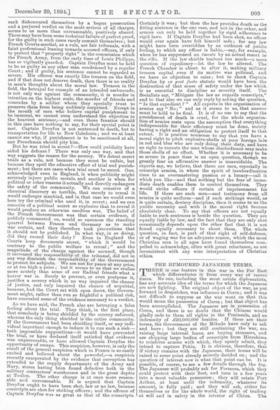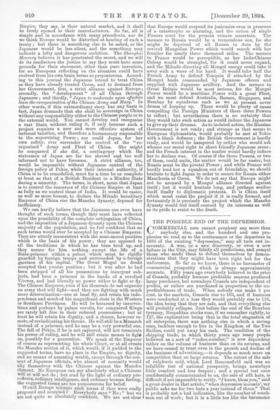THE RITM017RED JAPANESE TERMS.
THERE is one feature in this war in the Far East which differentiates it from every war of recent times. No one, including the most astute diplomatists, has any accurate idea of the terms for which the Japanese are now fighting. The original object of the war, as put forward in despatches, was influence in Coven; and it was not difficult to suppose as the war went on that this would mean the possession of Corea ; but that object has been accomplished. The Japanese are in possession of Corea, and there is no doubt that the Chinese would gladly cede to them all rights in the Peninsula, and an indemnity of £20,000,000 besides. If these are their terms, the Government of the Mikado have only to ask and have ; but they are still continuing the war, are raising large internal loans, are buying steamers, and are shipping large bodies of conscripts from Hiroshima toto reinforce armies with which, they openly admit, they intend to capture Pekin. It is obvious, therefore, that if victory remains with the Japanese, their terms raised to some point already secretly decided on ; and the question of interest now is what that point can be. It is possible, of course, to see a few details through the fog. The Japanese will probably ask for Formosa, which they could protect with their fleet, and turn in a few years into a most valuable poiisession ; they will retain Port Arthur, at least until the indemnity, whatever its amount, is fully paid ; and they will ask, either for themselves or for the whole world, the right of trading at will and in safety in the interior of China. The Empire, they say, is their natural market, and it shall be freely opened to their manufacturers. So far, all is simple and in accordance with many precedents, nor do we think Europe would be disturbed at hearing of such a treaty ; but there is something else to be asked, or the Japanese would be less silent, and the something may indicate a lofty and dangerous ambition. The Shanghai Mercury believes it has penetrated the secret, and we will do its conductors the justice to say they must have some grounds for their statement, other than pure invention, for no European reflecting on the situation could have evolved from his own brain terms so preposterous. Accord- ing to this journal the Japanese intend to treat China as they have already treated. Corea, and to demand from her Government, first, a strict alliance against Europe ; secondly, the " development " of all China through Japanese ; and thirdly, "Japan to undertake upon effective lines the reorganisation of the Chinese Army and Navy." In other words, if this extraordinary story has any basis in fact, Japan demands that she shall be sovereign in China without any responsibility either to the Chinese people or to the external world. You cannot develop and reorganise a vast State without ruling it, if only because such a project requires a new and more effective system of national taxation, and therefore e bureaucracy responsible to the supervising Power ; nor could apan, for her own safety, ever surrender the control of the " re- organised ' Army and Fleet of China. She might be conquered if she did, a contingency which the statesmen of Japan are far too shrewd and too well informed not to have foreseen. A strict alliance, too, would be impossible without Japanese control of the foreign policy of Pekin while their internal authority, if China is to be remodelled, must for a time be as complete at least as that of a British Resident in a Hindoo State during a minority. The terms, in short, mean that Japan is to control the resources of the Chinese Empire at least as fully as we control those of India. It would be easier, as well as more honest, to declare the Mikado hereditary Emperor of China vice the Manchu dynasty, deposed for inefficiency. We can hardly believe that the Japanese can even have thought of such terms, though they must have reflected upon the possibility of the complete subjugation of China, and the imposition of a Japanese dynasty upon the Chinese majority of the population, and we feel confident that no such terms would ever be accepted by a Chinese Emperor. They are utterly inconsistent with the semi-sacred position which is the basis of his power ; they are opposed. to all the traditions in which he has been bred up, and they secure for him nothing except the life of a State-prisoner within a palace which must be rigidly guarded by foreign troops and surrounded by a foreign garrison of his capital. The Great Mogul no doubt accepted that precise position; but it was after he had been stripped of all his possessions by insurgent sub- jects, had been a prisoner in the hands of a revolted Viceroy, and had literally no power either to fight or fly. The Chinese Emperor, even if his Generals do not organise an army that will fight—and they are fighting with much more determination—can at least fly, and retain his inde- pendence and much of his magnificent state in the Western or Southern Provinces. He will be harassed by insurrec- tions and perhaps by palace revolts, for conquered Kings are rarely left free in their reduced possessions ; but at least he will retain his dignity, and a chance, however re- mote, of revindicating his throne. He will still be a Monarch instead of a prisoner, and he may be a very powerful one. The fall of Pekin, if he is not captured, will not terminate his power of ruling, and he will still retain means to fig)* on, possibly for a generation. We speak of the Emperor of course as representing his whole Court, or at all events the Manchu section of it, which would, if it yielded to the suggested terms, have no place in the Empire, no dignity, and no means of amassing wealth, except through the con- sent of Japanese officials, who almost of necessity would ally themselves with the Chinese against the Manchu element. No European can say absolutely what a Chinese will or will not do ; but read by the light of ordinary pre- cedents, ordinary intelligence, and ordinary human feeling, the suggested terms are too preposterous for belief. Would Europe tolerate such terms if they were really proposed and accepted P Everybody says " No ; " but we are not quite so absolutely confident. We are not clear that Europe would suspend its jealousies even in presence of a catastrophe so alarming, and the action of single Powers must for the present remain uncertain. The menace to Russia would be a tremendous one, for she might be deprived of all Russia in Asia by the revived Mongolian Power which would march with her frontier for nearly three thousand miles. The menace to France would be perceptible, as her Indo-Chinese Colony would be strangled, for it could never expand, and the Mikado directing all Mongol energy could take it away with a wave of his hand. It would take half the French Army to defend Tonquin if attacked by the Mongol hosts commanded by Japanese officers and supplied with Japanese artillery. And the menace to Great Britain would be most serious, for the Mongol Power would be a maritime Power with a great Fleet, and we must defend Australia, Borneo, Singapore, and Bombay by squadrons such as we at present never dream of keeping up. There would be plenty of cause compelling the Foreign Ministers of these three Powers to reflect ; but nevertheless there is no certainty that they would take such action as would induce the Japanese to give up their dreams. As to isolated action, the Russian Government is not ready ; and strange as that seems to European diplomatists, would probably be met at Tokio with a blank defiance ; the British Government is hardly ready, and would be hampered by critics who would ask whence our moral right to shoot friendly Japanese arose ; and the French interest in the matter would hardly induce her to declare war. Of course if the three Powers, or two of them, could unite, the matter would be far easier, but Russia must be the pivotal Power ; and while France will hardly lend her a squadron out of friendship, we should hesitate to fight Japan in order to secure for Russia either Manchuria or Corea. We do not say that Europe might not be aroused by a Mongol alliance directed against itself ; but it would hesitate long, and perhaps sonfine itself finally to diplomatic protests. It is China itself which must resist the project if it is really formed, and fortunately it is precisely the project which the Mancha dynasty would feel itself coerced by its interests as well as its pride to resist to the death.



































 Previous page
Previous page